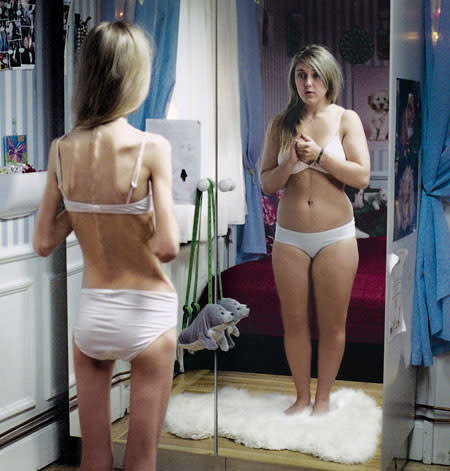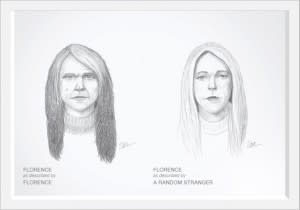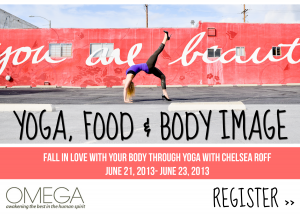Why Do Women Hate Their Bodies?

By Chelsea Roff
Do women see themselves less accurately than strangers do?
According to a study commissioned by Dove, only 4% of women around the world would describe themselves as beautiful. 72% of young girls included in the survey say they feel "tremendous pressure to be beautiful," and more than half (54%) agree that when it comes to how they look, they are their own worst beauty critic.* Another study found that 97% of women have negative body thoughts on a daily basis -- on average every 15 minutes.
That's a lot of time to spend castigating yourself.
These are no doubt alarming statistics, but it's difficult to completely understand the emotional impact of these beliefs from cold numbers alone. Perhaps that's why the team at Dove decided to perform a social experiment to test whether women's perceptions of their bodies differ from those of a stranger's. And they went about it in a way that might surprise you: by enlisting the help of a forensic sketch artist.

Dove
recruited seven women of varying ages and backgrounds and asked an FBI-trained forensic artist to create composite sketches based on each woman's description of her face. In the video, it quickly becomes apparent just how much the messages each woman has received about her physical appearance over the course of her life -- often from family, the media, etc -- shape the way she sees herself. And often, unsurprisingly, her underlying body hatred shines through.
"My mom told me I had a big jaw," one woman says. And another: "I kind of have a fat, rounder face."
The experiment was part of Dove's larger Campaign for Real Beauty, and in my opinion this video is moving in part because it sheds light on just how far our beliefs about what we look like can stray from reality. I can't help but think back to the days when, in the heat of my own battle with anorexia, I would gaze at this emaciated skeleton in the mirror and see only a "pooch belly" and "flabby arms." It didn't matter how skinny I got, my body was never "good enough." Fixing/controlling/hating my body had become a way of trying to work through emotions I didn't have the skills to communicate at the time. I needed to hate my body, because it was too hard to express what I really hated... myself.

Looking back, it's nearly unbelievable to me now that I was so unaware of how distorted my view of my body had become. I honestly believed I was fat, no matter how many times the people around me or numbers on a scale suggested otherwise.
I think it's important to acknowledge here that you don't have to have a clinical eating disorder to have distorted body image. Many of us are taught from an early age to loathe and fix and control our bodies, and these early experiences lay the groundwork for the seemingly mild distortions shown in this video, as well as more serious problems, like obesity and eating disorders. We learn to starve away anger and anxiety -- or, similarly, eat until sorrow and loneliness disappear. We let our body speak the messages we can't give voice to. We come to hate our bodies, often because we hate ourselves.
Often, we hear obesity talked about as "an epidemic" and anorexia as "an eating disorder." While they may seem like contradictory and unrelated diseases, I would argue that they likely stem from the same source: a fundamental problem with our relationship with food and our bodies. Research shows that both obesity and eating disorders are driven in part by depression, dieting behaviors, excessive weight concern, and what scientists call "loss of control eating." It seems to me Americans are not suffering from two distinct health problems -- anorexia, obesity, and the body hatred depicted in the Dove video are all symptoms of the same dis-ease.
I applaud Dove for challenging viewers to reflect on their own body image beliefs, but I would encourage viewers to take it one step further... to investigate the roots of those beliefs, and to explore what drives distorted body image to begin with (if you're interested, I'm teaching a retreat on this topic at the Omega Institute this June). As far as I can tell, the women in the video are not visually impaired, so if their perception of their bodies is different from that of strangers... the distortions are coming from somewhere else. I would argue that they are psychological in nature, and that an integrative solution to both obesity and eating disorders must help people foster healthier relationships with food and their bodies. This begins with teaching people emotional coping skills, encouraging them to listen to their bodies' internal cues, and promoting positive lifestyle changes for the sake of being healthy, not just attractive.
Finally, while Dove has been widely criticized for disguising ads behind the banner of a women's empowerment campaign, I still find myself at a loss for why it's "bad" for a company to combine positive sociocultural campaigns with profit-generating initiatives. If Dove sells more soap as a result of their Campaign for Real Beauty, I say all the more power to them.
Watch the video for yourself on Intent Blog, and I would love to hear your thoughts on the ideas I've expressed in this article in the comments below.
*****

Join Chelsea for her upcoming retreat - Yoga, Food, & Body Image: Fall in Love With Your Body Through Yoga - at the Omega Institute June 21-23, 2013. This program covers how to use the practice of yoga to support developing a healthier relationship to food, body image, and of course, yourself. The program covers how life experiences like dieting, eating disorders, pregnancy, and menopause impact us both physically and emotionally, and how yoga can be a tool for learning to navigate those life transitions with grace. A limited number of scholarships are available - contact Chelsea to inquire.
*****
*Source: Dove Research: The Real Truth About Beauty: Revisited
Image 1: Unknown (please contact us if you know where it came from so we can give appropriate credit)
Image 2 & 3: Dove Real Beauty Campaign (screenshots)
